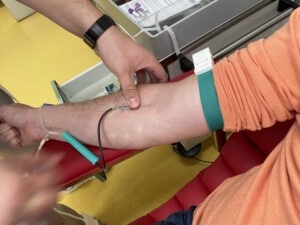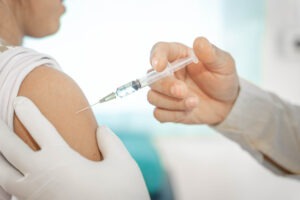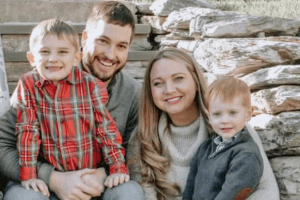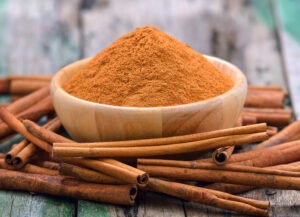Here’s how to treat mild or moderate COVID-19 and alleviate symptoms, with help from over-the-counter medications, non-drug strategies, antiviral pills, remdesivir, or monoclonal antibodies. You may need to isolate in your house, but you don’t have to fight COVID-19 alone: Call your doctor to figure out next steps.
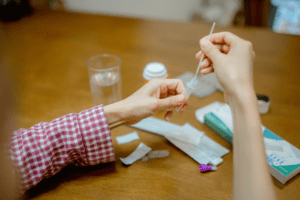
If you come down with mild or moderate COVID-19, you probably know that you need to stay home to avoid infecting other people. But you may not know all the things you can do to battle the virus. Over-the-counter drugs and non-drug interventions can help you cope with COVID-19 symptoms, which are typically some mix of runny nose, headache, fatigue, sneezing, sore throat, cough, shortness of breath, muscle or body aches, fever or chills, or other issues.
If you are at high risk of becoming extremely sick or even dying from COVID-19 — because you are elderly or obese, for example, or because you have a medical condition like diabetes — you may be eligible for new experimental therapies authorized for emergency use by the U.S. Food and Drug Administration (FDA).
Unfortunately many people do not have easy access to these treatments, which include antiviral pills like the highly effective Paxlovid.
The first thing you should do if you think you have COVID-19: Confirm with a test, since the symptoms of COVID-19 can resemble those of other conditions like the common cold or seasonal allergies. If you test positive, call your doctor. Even if you think your symptoms are not severe enough to bother a healthcare provider about in the middle of a pandemic, it’s still important to reach out.
“We don’t want people to suffer in silence, at home and possibly alone,” says Paul Pottinger, MD, an infectious-disease doctor at the University of Washington School of Medicine in Seattle. The following are signs and symptoms of severe COVID-19 that should prompt you to seek immediate emergency care, per the Centers for Disease Control and Prevention (CDC):
- Trouble breathing
- Persistent pain or pressure in your chest
- New confusion
- Inability to wake up or stay awake
- Pale, gray, or blue lips, skin, or nail beds (depending on skin tone)
“If someone is really sick with symptoms of COVID-19, an in- person assessment is the best way to determine the course of treatment. There are certain vital-sign measurements that just can’t happen via Zoom or a telephone call,” says Dr. Pottinger. Doctors generally do the following during a COVID-19 evaluation. Check your vital signs. In addition to measuring your heart rate, blood pressure, and body temperature, physicians will assess your respiratory rate, which is how many breaths you take per minute. In a healthy person that would be around 12 to 16, according to Johns Hopkins Medicine. A respiratory rate of 23 or greater is a red flag, per UW Medicine.
Doctors may also evaluate how well your lungs are working by using a pulse oximeter. This device clips on a body part such as a finger or earlobe to measure oxygen saturation (oxygen level) in the blood, according to John Hopkins Medicine.
Inquire about your age and medical history. To determine your risk of becoming extremely ill, your doctor will ask your age. “That’s because people over the age of 65 tend to have a more severe course of COVID-19 and have a relatively higher risk of dying as a result of the infection,” Pottinger explains. A physician will also ask about any underlying medical conditions you have as well as your health history. “For example, is your immune system normal, or is it reduced in some way due to a disease process or treatment of a condition that you have?” says Pottinger.
- Cancer
- Chronic kidney disease
- Chronic liver disease
- Chronic lung diseases, including COPD (chronic obstructive pulmonary disease), asthma (moderate to severe), interstitial lung disease, and pulmonary hypertension
- Cystic fibrosis
- Dementia or other neurological conditions
- Diabetes (type 1 or type 2)
- Disabilities, including Down syndrome
- Heart conditions, such as heart failure, coronary artery disease, cardiomyopathies, and possibly hypertension
- HIV infection
Immunocompromised state, including a weakened immune system caused by prolonged use of corticosteroids or other immune-weakening medicines (Note: Some individuals with autoimmune diseases such as rheumatoid arthritis who take medications that suppress their immune systems may be at heightened risk of severe COVID-19.)
- Mental health conditions, including depression and schizophrenia spectrum disorders
- Overweight and obesity
- Physical inactivity
- Pregnancy
- Sickle cell disease or thalassemia
- Smoking, currently or in the past
- Solid organ or blood stem cell transplant
- Stroke or cerebrovascular disease
- Substance use disorders
- Tuberculosis
Conduct a physical examination. Your doctor will listen to your heartbeat and breathing, and ask about your symptoms, including how intense they are and when they started. COVID-19 has a broad range of symptoms — everything from new loss of taste and smell to a rash known as
“COVID toes” — so you should keep track and tell your doctor about all of them, even if you aren’t sure they are related to COVID-19.
Your doctor will use his or her clinical judgment, in conjunction with lab work, to determine if you need to be admitted to the hospital. “It’s hard to describe, but it’s part of the practice of medicine to identify a patient who is just not going to thrive when they go home,” says Pottinger.
Recovering from COVID-19 at home can be overwhelming. There are Drug-Free Strategies for Feeling Better When You Have Mild or Moderate COVID-19.
Here are a few simple physician-recommended ways to cope with COVID-19 symptoms.
Natural Remedies for COVID-19 Symptoms
The following strategies can be part of an overall treatment plan.
Difficulty breathing
If you are having symptoms of mild or moderate dyspnea (difficulty breathing), schedule an appointment with your doctor. They may recommend that you lie prone, or facedown, rather than flat on your back.
Shortness of breath
If being short of breath makes you anxious, your doctor may advise breathing exercises that can help.
Cough
For help managing a cough, try cough drops, Vicks VapoRub, and hot water or hot tea with lemon.
Dehydration
To reduce the risk of dehydration, drink fluids regularly and keep eating. Aim for at least 64 ounces (8 cups or about 2 liters) of water every day. If you are sweating a lot from a fever, you may want to supplement water with an electrolyte-containing sports drink, such as Gatorade, according to Geisinger Health System.
Eating issues
To make eating easier, opt for foods that are easy to digest and relatively bland, such as chicken noodle or vegetable broth soup, avocados, or toast. While loss of taste and smell can make food unappetizing, good nutrition will aid your recovery.
A study published in July 2021 in Food Science & Nutrition found that for people with mild or moderate infections, strategies like staying physically active, sleeping seven hours per day or more, drinking 2 liters or more of water per day, and consuming more plant-based proteins “can provide a significant role in early and safe recovery from COVID-19.”
Over-the-Counter Medications for COVID-19
University of Chicago Medicine says some over-the-counter medications may improve symptoms of COVID-19. Fever, body aches, or headache Try acetaminophen (Tylenol), naproxen (Aleve), or ibuprofen (Advil, Motrin) — assuming you don’t have any pre-existing conditions or allergies that would make these drugs risky for you. If you are very congested, short-term use of a nasal decongestant, such as a nasal spray, may help unblock your nose and open your sinuses, says Pottinger.
Antiviral Pills
The FDA has granted emergency-use authorization for two prescription antiviral treatments administered orally as pills: Paxlovid (nirmatrelvir tablets and ritonavir tablets) by Pfizer and Lagevrio (molnupiravir) by Merck. These treatments work differently but are both used outside of a hospital setting and in individuals who have tested positive for COVID-19 and are at high risk for COVID-19 complications.
Paxlovid
Paxlovid can be used to treat mild or moderate COVID-19 in adults and children ages 12 and older who weigh at least 88 pounds, have tested positive for COVID-19, and are at risk of severe illness or death from the disease, according to the FDA. Patients take the three-pill therapy (two tablets of nirmatrelvir and one tablet of ritonavir) twice a day for five days, for a total of 30 pills. Treatment must begin within five days of the onset of symptoms.
Nirmatrelvir helps prevent the novel coronavirus from replicating, while ritonavir slows the breakdown of nirmatrelvir to extend its presence and maintain its concentration in the body. Paxlovid costs $530 per course, as Reuters reported on December 22.
Paxlovid may not be a good fit for people with uncontrolled or undiagnosed HIV, as well as those with severe liver or kidney disease. Paxlovid also may interfere with various medications, which the FDA lists on its website. Side effects include the following, according to the FDA:
- High blood pressure
- Muscle aches
- Gastrointestinal issues like diarrhea
- Loss of taste
Molnupiravir
Molnupiravir, which according to a December 23 article in The New York Times costs $700 per course, is authorized for use only in adults who test positive for COVID-19 and are at risk of complications or death from the disease, notes the FDA. The four-pill therapy is taken twice a day for five days, for a total of 40 pills, and works by causing a fatal genetic mutation in the coronavirus, according to an article published October 9, 2021, in Nature.
Like Paxlovid, molnupiravir should be taken within five days of COVID-19 symptom onset.
The FDA recommends the drug only when Paxlovid and remdesivir (see below) are not accessible or “clinically appropriate.” The agency advises pregnant women to avoid molnupiravir because some animal studies have found the drug may cause birth defects.
Side effects of molnupiravir may include the following, per the FDA:
- Nausea
- Dizziness
- Diarrhea
Be sure to talk to your doctor about any health conditions you have and any medications you’re taking if you’re prescribed Paxlovid or molnupiravir.
Remdesivir
Remdesivir (Veklury), the antiviral infusion medication that doctors have used to treat hospitalized COVID-19 patients since early in the pandemic, is now an option for people recovering from COVID-19 at home.
In 2022, the FDA expanded eligibility for remdesivir to adults, children, and babies with mild or moderate COVID-19 who are at high risk of severe illness.
Healthcare providers administer remdesivir with an IV in sessions that take place over three consecutive days, requiring patients to make repeat visits to a hospital or outpatient clinic. Talk to your primary medical team about whether you are an appropriate candidate for remdesivir, and whether the benefits outweigh the risks given your health status.
A course of remdesivir for a nonhospitalized adult has an out-of-pocket cost of $2,800, according to a January 21 New York Times article. Insurance coverage may reduce this price.
Monoclonal Antibody Treatment
Monoclonal antibodies are molecules produced in a lab that mimic those naturally made by the body’s immune system to fight invading pathogens such as viruses. Monoclonal antibody drugs for mild or moderate COVID-19 are generally administered by IV (intravenous infusion) at an outpatient infusion center (generally at a hospital or other medical center). The whole treatment process takes about two to three hours, with the IV delivery of the drug taking about an hour. An infusion of monoclonal antibodies gives the immune system a boost, says Pottinger, reducing the risk that someone will need to be hospitalized, and in some studies, lowering the odds of dying.
“Unfortunately, the magnitude of that benefit is much smaller than we’d like it to be — it’s not a miracle cure,” Pottinger says. The rise of the omicron coronavirus variant, which displaced the delta variant at the end of 2021 to become the predominant type in the United States, has reduced the number of monoclonal antibody options. The FDA now limits the use of two major monoclonal antibody treatments that the agency says are highly unlikely to be effective against omicron: REGEN-COV (the combination of casirivimab and imdevimab) from Regeneron and the combination of bamlanivimab and etesevimab from Eli Lilly.
The agency has also removed its emergency-use authorization for sotrovimab (Xevudy), which data shows is unlikely to be effective against the omicron BA.2 subvariant.
Currently only one monoclonal antibody treatment is available in the United States: Eli Lilly’s bebtelovimab.
Who Is Eligible to Receive Monoclonal Antibody Treatment
The FDA authorized bebtelovimab in February 2022 to treat mild or moderate COVID-19 in adults and children 12 and over (and weighing at least 40 kilograms, or about 88 pounds) who have tested positive for COVID-19 with symptoms for seven days or less, who are at high risk of progression to severe COVID-19, hospitalization, or both.
People at high risk include those who are 65 and older as well as those with the underlying medical conditions detailed above. Importantly, doctors should only prescribe bebtelovimab to patients who are not candidates for Paxlovid or remdesivir. In addition to meeting these criteria, you’ll also need a referral from your healthcare provider, according to the U.S. Department of Health and Human Services (HHS).
If you have symptoms but no healthcare provider, phone the government-run Combat COVID Monoclonal Antibodies Call Center at 877-332-6585.
Where to Get Monoclonal Antibody Treatment
To find an infusion center near you, ask your healthcare provider or visit the HHS distribution website.
Insurance Coverage of Monoclonal Antibody Treatment
The federal government has purchased a supply of monoclonal antibody treatments and has made them available at no cost to patients for the antibody product itself, according to the HHS.
But because the treatment needs to be delivered via infusion, there may be an administrative charge, and that fee will vary according to both your provider and your insurance coverage. Medicare will cover that cost, while Medicaid coverage varies from state to state, according to HHS. If you have private insurance, contact your insurance provider to find out what it will cover.
Uninsured people should ask the treatment facility about charges.
Debunked or Unproven COVID-19 Treatments: Hydroxychloroquine and Ivermectin
Social media continues to spread unsupported or unhelpful claims about COVID-19 treatments, most prominently about hydroxychloroquine and ivermectin. “There is no evidence to support their use; there is actually quite a bit of evidence to show that they don’t help,” Pottinger says.
The most recent review of the existing evidence finds not only the lack of a significant benefit but also some suggestion of harm, particularly in older patients with existing heart disease or risk factors, according to the authors of a commentary published in August 2021 in the American Journal of Medicine. Ivermectin This drug is commonly used to treat or prevent parasites in animals, and ivermectin tablets are approved at specific doses to treat some parasitic worms in humans. A clinical trial concluded that ivermectin does not prevent mild or moderate COVID-19 from becoming severe; research published in March 2022 found that treatment with ivermectin didn’t keep people with COVID-19 out of the hospital.
Taking large doses of ivermectin is dangerous, as is using medications intended for animals. Animal ivermectin products are very different from those approved for humans, per the CDC.















